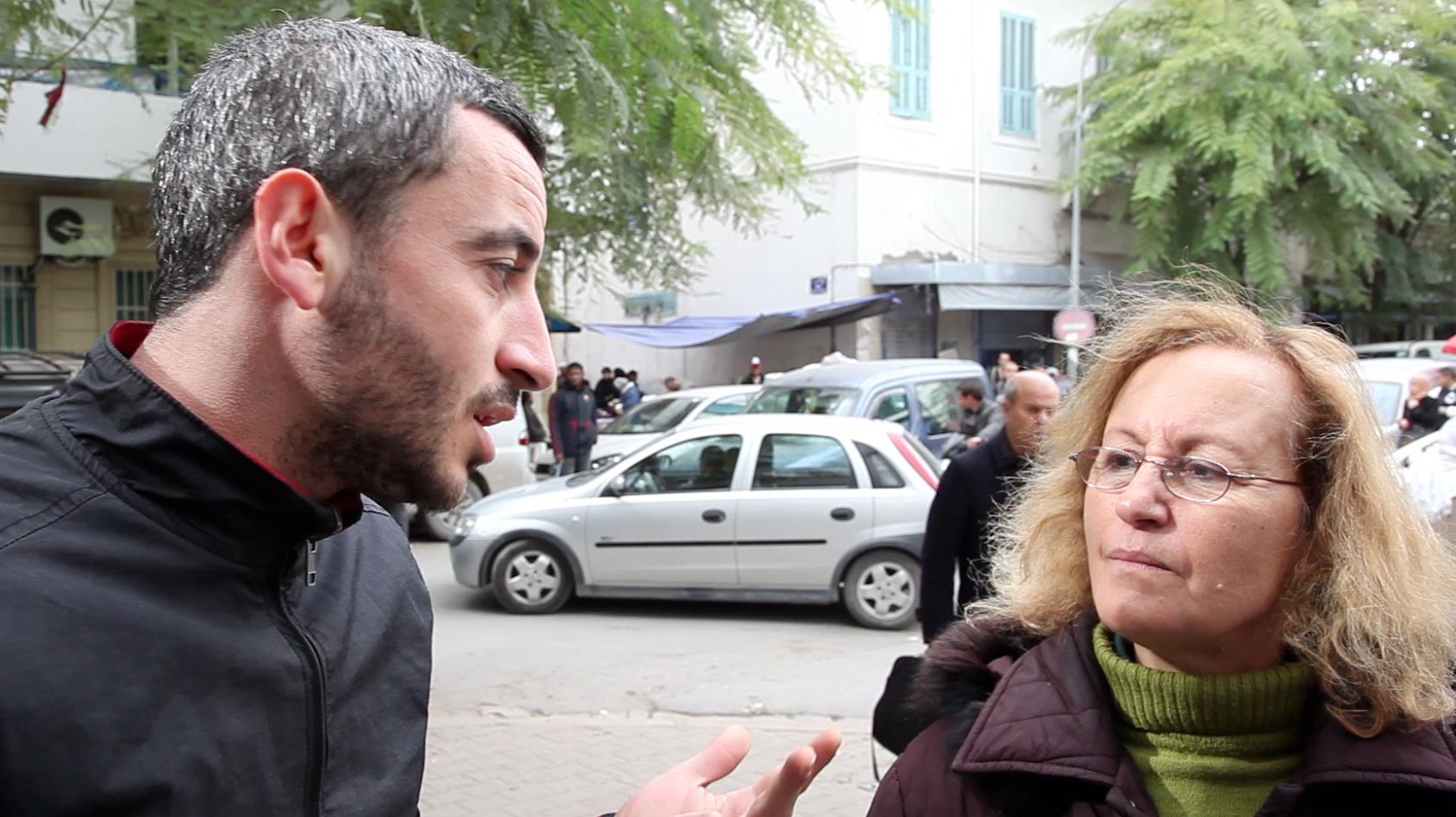We were on a small street just off the grand boulevard, Avenue Habib Bourguiba, in the heart of Tunis, interviewing people who wanted to talk about the state of Tunisia one year after the revolution. Having visited Tunisia 15 years ago, when the sight of a camera would send Tunisians scurrying in the opposite direction, I still expected people to run from rather than toward anything that looked like press.
But we didn’t go 50 feet before we were surrounded by a throng of people who were not only willing to talk, but insisted on giving their opinion to the camera, something that would have been unthinkable in the 1990s. We found people frustrated by the lack of job options in Tunisia today as well as those who thought that one of the biggest problems facing the country was that the legal system hadn’t yet caught up to the worst sins of a corrupt regime. A man from Jendouba, a rough-and-tumble town bordering Algeria, told us that the newly-elected government had done nothing for him and changed nothing. He was followed by a strident bearded young man in a baseball hat who told us that Ennahda, the ruling centrist Islamist party, hadn’t gone far enough to protect the morals of the country. His speech drew several people who wanted to give us the other side.
Souhail Benchitima, a 26-year-old chemical engineer, came back from studying in Russia five months ago to start a plastics company in Tunisia because he felt it was his responsibility to help create work for his fellow Tunisians. In English, he called for patience.
“This revolution was made because the economy was bad; people didn’t get jobs," he said. "We just need some time, some investments to create jobs.”
Benchitima voiced the opinion of others I heard before and after: “In Tunisia we have only one year after the revolution. We have safety. You can see police everywhere. They’re doing their jobs…this is amazing.”
“What jobs?” a woman in a long brown overcoat, who did not give her name, interrupted in English. “There are no jobs.”
“You must be patient,” Benchitima told her. “We Tunisians must help ourselves.”
Woman: "No jobs. No, there is no jobs for the youth. No youth have jobs now."
Benchitima: "I think it’s just a matter of time because you have to be patient."
Woman: "Yeah, patient, because the new government…they can’t do anything for the young."
Benchitima: "We still have our minds. The young people, they still keep thinking…it’s not only the government’s job to create jobs. The young people are responsible."
Woman: "Yes, but they need help—they need money."
The situation in Tunisia supports both points of view. Tourism is stagnant, and unemployment, which hovered at 13 percent a year ago, approaches 20 percent today—soaring to 40 to 50 percent in some parts of the country. Strikes of all sorts have become common, as have political protests. Yet it seems premature to judge an interim government that has only been on active duty for about a month.
Ahmed Fares, a bystander with vibrant blue eyes, asked me if he could join in the discussion that we were filming in English. I told him of course.
Fares: "We should be patient. We should not ask them to give us jobs and money. One year is not enough…We have to give them time."
Woman: "It’s very difficult…"
Fares: "Which is better? Government under Ben Ali or what we are living now? We are free. We can talk to them (pointing at my cameraman and me). Under the regime of Ben Ali we couldn’t even stop to talk. And even her (pointing at me), she hadn’t the right to ask us to make this interview."
Woman: "You can say that we are free now."
Fares: "It’s a gift. And we have to keep it."
Fares: "It’s a new Tunisia…We should be strong and we have to stand to really protect this revolution. We should not ask them (the government) for things that they cannot do…If we want to build this country on strong pillars, we have to participate. We should not ask them, 'Just give me'. We have to give in order to take."
As a journalist who has worked and traveled throughout the Arab world, I found this exchange the most hopeful sign of life after the Arab Spring that I’d yet encountered. In Lebanon, Egypt, Syria, Morocco, Oman and Tunisia years ago I had consistently found that most people would only give you their frank opinion of the government in the safety of their own homes, if at all. These people were speaking frankly to each other in the middle of a bustling street, without having to worry that they would be ratted out by their neighbors—in a country where an estimated one out of every six males was paid by the former regime to spy on his fellow citizens. And not only were they talking about their fears and disappointments, but they were inviting me to film their debate. Spectators, many with the beards and dress of conservative Islam, listened raptly as these two men discussed their common concerns with a woman and listened respectfully to her answers. There was no censorship and no fear.
Fares closed the debate with a final message: "For those who are living in America, it’s a message from a Tunisian citizen: You are safe. If you come here you are safe…I’m encouraging tourism, people from all over the world to see what is really happening in real life (here)…this strong nation that really changed the world."
